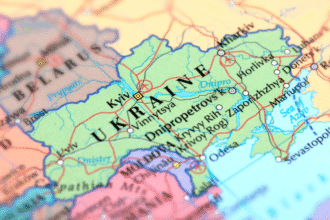A Ukrainian drone attack has been connected to a huge-scale fire at an oil depot close to Sochi, Russia. According to Russian officials, the overnight strike caused significant damage to a fuel tank, resulting in a massive blaze. Firefighters have been quickly dispatched to the scene, and after hours of work, the fire changed into sooner or later brought under control. The attack resulted in transient flight suspensions at Sochi Airport, which had previously hosted the 2014 Winter Olympics.
What Happened in Sochi?
In a dramatic development, the Governor of Krasnodar, Veniamin Kondratyev, confirmed that the Ukrainian drone assault brought about a gasoline tank explosion, sparking a raging fire on the oil depot close to the Black Sea resort. The flames engulfed a huge area, causing tremendous damage to the facility. Despite the chaos, 127 firefighters were able to extinguish the fire with the aid on Sunday night.
The attack induced a temporary disruption at Sochi Airport, halting flights for a brief period. The airport, a crucial transportation hub, had to drop operations to ensure safety, creating a ripple effect on air travel in the area. Here is the link to our article on Ukraine Drone Strikes.
Why Are These Attacks Happening?
This Ukraine drone assault is a part of a broader approach to retaliate in opposition to Russia’s ongoing military offensive. Ukrainian forces were increasingly more focused on Russian energy infrastructure in response to Russian airstrikes on Ukraine’s power grid. In the past few weeks, Russia has escalated its bombardments, and Ukraine has retaliated with precision strikes, inclusive of drone assaults on critical installations, including oil depots and power hubs.
The Ukraine drone attack on Sochi is seen as one of the most giant attacks against Russian infrastructure in recent weeks. The Russian government confirmed that drones have also been launched towards numerous principal Russian towns, including Ryazan, Penza, and Voronezh, which brought about similar destruction and accidents.
How Has Russia Responded?
Russia’s protection ministry reported that its air defenses intercepted 93 Ukrainian drones in a recent overnight attack. While maximum of the drones had been neutralized over the Black Sea region, the closing drones managed to hit their targets, contributing to the damage at various facilities.
Meanwhile, Ukraine has not formally commented on the drone attack in Sochi; however, it has been part of their broader attempt to target the Russian army and electricity infrastructure. Ukrainian officials stated that their air forces correctly shot down a massive number of incoming Russian drones and missiles, underscoring the continued tit-for-tat battle inside the country. Here is the link to our article on Ukraine Strikes Russia
What Are the Consequences for Ukraine?
While Ukraine has confronted great losses, consisting of civilian casualties and destruction of homes, the retaliatory moves continue as part of a much wider strategy to counter Russia’s offensive. For example, in Kherson, a key bridge changed into once again hit, main local officials to call for partial evacuations. The persistent violence has raised tensions, with numerous Ukrainian areas under regular threat from Russian strikes.
Ukraine drone attacks like the one in Sochi spotlight the growing talents of Ukrainian forces to goal vital infrastructure inside Russia. These assaults intend to disrupt the Russian logistics and its capacity to hold long-term offensive operations. However, it additionally escalates the continued war, with each side suffering large losses.
Final Thoughts
The Ukraine drone attack on the Sochi oil depot is just one example of the escalating conflict between Ukraine and Russia. The assault not only induced sizable damage to Russian infrastructure but also disrupted important operations at Sochi Airport. As both countries target each other’s power sources, it appears that such Ukrainian drone attacks will remain a primary tactic in the ongoing battle. The evolving state of affairs affords a complex challenge for both aspects, and not using an immediate decision in sight.








